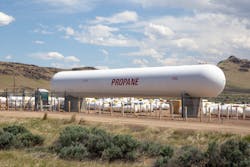Will Carbon Dioxide To Propane Conversion Close Carbon Cycle?
Researchers from the University of Pennsylvania, Illinois Institute of Technology and the University of Illinois at Chicago have published a paper in Nature Energy, which unveiled a system that can transform CO2 emissions into cleaner, more energy-dense propane (C3H8). This process addresses energy storage challenges and offers a means to significantly decrease CO2 levels, thereby mitigating environmental impact.
Traditionally, copper has been utilized for CO2 conversion, yielding low-energy-density single-carbon compounds. The research team aimed to surpass these limitations by introducing ionic liquid (IL) into the catalytic system and exploring tri-molybdenum phosphide (Mo3P) as a catalyst material. Through theoretical simulations, they discovered that the IL layer enhances CO2 adherence and stabilizes intermediates on the Mo3P catalyst surface, resulting in an unprecedented 91% efficiency in producing C3H8.
This breakthrough offers a new perspective on the relationship between materials in electrocatalytic systems. The researchers intend to expand their work in two key directions: firstly, by developing an ionic liquid catalog for efficient fuel-generating catalysts and electrochemical systems; secondly, by investigating alternative catalysts to convert CO2 into higher-energy-density fuel sources, spanning from fuel gas to light oil with more carbon atoms.
Extending this research to heavier hydrocarbons could effectively close the carbon cycle, enabling the direct production of natural gas, propane, gasoline and jet fuel from previously emitted CO2. This transformative cycle would harness and reuse carbon atoms for energy, preventing their release into the atmosphere.
